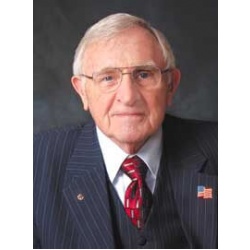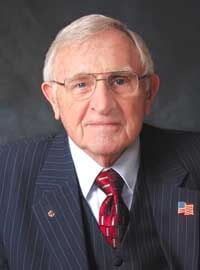
decorahnews.com feature: This Harper's Ferry resident spent his career working with the CIA and FBI
Lowell Engle is an Iowa native with a long and impressive resume. His past employers include the FBI and the CIA, his skill set includes things like cryptanalysis and foreign language, and his employment history includes assignments in 46 countries. Much of the information about Engle's extensive career history remains classified, but what isn't is shared in this story - the story of a typical Iowa farm boy whose career took a very untypical path.
Engle's life began like many others. He was born in Hampton and graduated from Tripoli High School. It was during his first year at Iowa State Teacher's College (UNI), that his life took a significant turn. He learned that the FBI was recruiting and his curiosity was instantly piqued. After a lengthy background investigation, Lowell was accepted into the FBI and was on his way to Washington, D.C.
Lowell began his FBI work in the Intelligence Division and was trained in cryptanalysis, the breaking of codes and ciphers. He spent most of his time working on the case of KGB spy Col. Rudolf Abel, which later became a movie starring Tom Hanks called "Bridge of Spies." Over the course of the next two years, Lowell's life was consumed with FBI assignments and night school classes at George Washington University. The FBI assignments required so much overtime that he eventually made the difficult decision to quit the FBI and focus on finishing his degree at University of Iowa.
It wasn't long before Lowell added another line to his resume - he joined the U.S. Army. While in the Army, Lowell spent time in Japan which sparked his interest to travel and pursue a career overseas. Two years later, his dream became a reality when Lowell began working with the Foreign Service. He spent the next 25 years working with the State Department and Department of Defense, and almost all of that time was spent overseas. His career took him to Africa twice, Iran, South America, Central America, Pakistan, and Spain.
After traveling the world, Lowell was finally looking forward to retirement. In 1991 he moved back to Iowa (Harpers Ferry) with the dream of farming and building a house, but before it was even finished, the CIA contacted him and offered him a contract. This was the first of many more to come. Retirement would have to wait.
Almost all of his CIA contracts were in Latin America, where he had previously served with the State Department during the Cold War. Most of his work with the CIA was in conjunction with the Drug Enforcement Administration (DEA), tracking drug movements and the organization of the drug cartels in Columbia.
In 1993 Lowell worked with the DEA to bring down the Cali Cartel, a drug cartel in southern Columbia. This two-year project resulted in the take down of the principal family members of the Cali Cartel, and two Rodriguez Orejuela family members are still in prison as a result of this take down.
During this time, the DEA also started taking a great deal of interest in The Revolutionary Armed Forces of Colombia (FARC - Colombia's largest rebel group), because of their involvement in the narcotics business. In 2003, Lowell began working as a liaison officer directly with the Colombian Army Intelligence to help rescue the three Americans hostages. After 5 1/2 years the Americans were finally brought home safety. Lowell says this is an accomplishment he was very proud to be a part of.
Lowell also worked on the case of the take over of the Japanese Ambassador's residence in Lima, Peru in 1996-1997. "That was a tough job during which time we worked 24 hours on and 24 hours off to accomplish the rescue mission. I do lectures about that case and the American hostages in Colombia. I can talk about those cases because almost all of the details of the rescue in both cases was made public by the Peruvian and Colombian governments respectively." Lowell also did a lot of decrypting of messages that were instrumental in bringing a successful conclusion to several cases, but most of those cases are classified so he cannot discuss them.
Lowell bought a farm in Harpers Ferry back in 1972 with specific goals in mind, and 45 years later, he is finally able to start working toward his goals. Although he is officially retired from taking down drug cartels and rescuing hostages, he stays busy in other, less classified ways: tree farming, hunting, fishing, building furniture and woodworking projects.
His advice for a successful career path is, "Make sure you get a good education, stay away from drugs, do volunteer work, study American history, create a good reputation for yourself, and learn a foreign language - it can really open doors that are otherwise not available." That sounds like good advice for everyone--even non-spies.
Site designed and maintained by Iroc Web Design Services©.
Your Small Business Web Design Solutions.™


